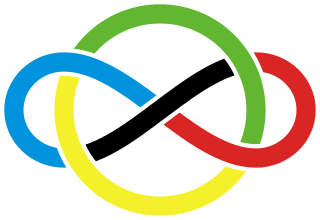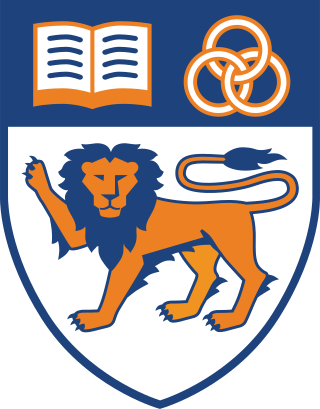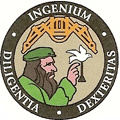Related Research Articles

The International Mathematical Olympiad (IMO) is a mathematical olympiad for pre-university students, and is the oldest of the International Science Olympiads. It is “the most prestigious” mathematical competition in the world. The first IMO was held in Romania in 1959. It has since been held annually, except in 1980. More than 100 countries participate. Each country sends a team of up to six students, plus one team leader, one deputy leader, and observers.

The National University of Singapore (NUS) is a national public collegiate and research university in Singapore. Founded in 1905 as the Straits Settlements and Federated Malay States Government Medical School, NUS is the oldest autonomous university in Singapore. It offers degree programmes in disciplines at both the undergraduate and postgraduate levels, including in the sciences, medicine and dentistry, design and environment, law, arts and social sciences, engineering, business, computing, and music.

The Canadian Mathematical Society (CMS) is an association of professional mathematicians dedicated to the interests of mathematical research, outreach, scholarship and education in Canada. It serves the national community through the publication of academic journals, community bulletins, and the administration of mathematical competitions.

Hwa Chong Institution (HCI) is a independent secondary educational institution in Bukit Timah, Central Region, Singapore. It was established in 2005 by the merger of The Chinese High School (1919–2004) and Hwa Chong Junior College (1974–2005).

Hai Sing Catholic School (HSC) is a co-educational government-aided Catholic secondary school in Pasir Ris, Singapore. Founded by the Franciscan Missionaries of Mary (FMM) sisters in 1959, it is affiliated to Catholic Junior College. The school has temporarily moved from its permanent site to its holding site at 15 Pasir Ris Street 21 until Dec 2025.

The NUS High School of Math and Science, also known as NUS High School or NUSH, is a specialised independent high school in Singapore offering a six-year Integrated Programme (IP) leading to the NUS High School Diploma. Its parent university is the National University of Singapore.
Yusof Ishak Secondary School (YISS) is a co-educational government secondary school located in Punggol, Singapore. The school is named after Yusof Ishak, the first President of Singapore.

Nanyang Junior College (NYJC) is a junior college in Singapore next to Lorong Chuan MRT station, offering two-year pre-university courses leading up to the GCE Advanced Level examinations.

Tanjong Katong Secondary School (TKSS) is a co-educational government autonomous school in Singapore. Before its autonomous status, the school was frequently named by the Ministry of Education (MOE) as the 'Best Non-Independent and Non-Autonomous Secondary School' in its annual ranking of secondary schools, which has since been abolished. TKSS was awarded the School Excellence Award in 2007, the highest tier in the masterplan of awards given by MOE to schools in Singapore.

Imre Bennett Leader is a British mathematician, a professor in DPMMS at the University of Cambridge working in the field of combinatorics. He is also known as an Othello player.
The Singapore Mathematical Olympiad (SMO) is a mathematics competition organised by the Singapore Mathematical Society. It comprises three sections, Junior, Senior and Open, each of which is open to all pre-university students studying in Singapore who meet the age requirements for the particular section. The competition is held annually, and the first round of each section is usually held in late May or early June. The second round is usually held in late June or early July.
The Bangladesh Mathematical Olympiad is an annual mathematical competition arranged for school and college students to nourish their interest and capabilities for mathematics. It has been regularly organized by the Bangladesh Math Olympiad Committee since 2001. Bangladesh Math Olympiad activities started in 2003 formally. The first Math Olympiad was held in Shahjalal University of Science and Technology. Mohammad Kaykobad, Muhammad Zafar Iqbal and Munir Hasan were instrumental in its establishment.

Yum-Tong Siu is the William Elwood Byerly Professor of Mathematics at Harvard University.
This article describes the selection process, by country, for entrance into the International Mathematical Olympiad.
The Canadian Open Mathematics Challenge (COMC) is an annual mathematics competition held in Canada during the month of October. This competition is run by the Canadian Mathematical Society. Students who score exceptionally well on this competition are selected to participate in the Canadian Mathematical Olympiad.
Lam Lay Yong is a retired Professor of Mathematics.

The Asia Cup Moot, or Asia Cup in short, is an annual international moot court competition that is open to law schools in Asia. The competition inaugurated in 1999 and is held in Tokyo, Japan. It is jointly organised by the Ministry of Foreign Affairs of Japan and the Japanese Society of International Law, and the moot problem typically contains issues pertaining to public international law, international humanitarian law, and international human rights. The top 16 teams based on memorial scores qualify for the international rounds in Tokyo, but generally each country except Japan is only permitted to send one team. Each team may feature up to four oralists. As of 2023, 61 different law schools have competed in Tokyo since the moot's inception.

Yale-NUS College is a liberal arts college in Singapore. Established in 2011 as a collaboration between Yale University and the National University of Singapore, it is the first liberal arts college in Singapore and one of the first few in Asia. With an average acceptance rate of 5.2%, it is among the most selective institutions in the world. Yale-NUS was the first institution outside New Haven, Connecticut that Yale University had developed in its 300-year history, making Yale the first American Ivy League school to establish a college bearing its name in Asia.
Peng Tsu Ann is a Singaporean mathematician, and the first University of Singapore graduate to obtain a PhD in mathematics. Peng was the Head of the Department of Mathematics at NUS from 1982 to 1996 and oversaw its rapid growth during the period.
References
- ↑ "Singapore | International Mathematical Union (IMU)". www.mathunion.org. Retrieved 9 October 2023.
- ↑ "Singapore Mathematical Society (SMS)". Singapore National Academy of Science. Retrieved 9 October 2023.
- ↑ "Strong Showing by Singapore Students at International Olympiads". www.moe.gov.sg. Retrieved 10 October 2023.
- ↑ "Singapore Mathematical Society". Maths History. Retrieved 11 October 2023.
- ↑ Chi Tat, Chong (16 December 2016), "Fifty Years of Mathematics in Singapore: A Personal Perspective", 50 Years of Science in Singapore, WORLD SCIENTIFIC, pp. 105–118, retrieved 23 October 2023
- ↑ "Milestones of the Society – Singapore Mathematical Society". sms.math.nus.edu.sg. Retrieved 11 October 2023.
- ↑ "Our History". Singapore National Academy of Science. Retrieved 11 October 2023.
- ↑ Goy, Priscilla (14 May 2015). "When it comes to education, Singapore is a world-beater". The Straits Times. ISSN 0585-3923 . Retrieved 11 October 2023.
- ↑ "Singapore Mathematics Project Festival – Singapore Mathematical Society". sms.math.nus.edu.sg. Retrieved 11 October 2023.
- ↑ "Rules of the Festival – Singapore Mathematical Society". sms.math.nus.edu.sg. Retrieved 10 October 2023.
- ↑ "Rules – Singapore Mathematical Society". sms.math.nus.edu.sg. Retrieved 11 October 2023.
- ↑ "Categories and Prizes – Singapore Mathematical Society". sms.math.nus.edu.sg. Retrieved 11 October 2023.
- ↑ "SMS Lecture Series – Singapore Mathematical Society". sms.math.nus.edu.sg. Retrieved 11 October 2023.
- ↑ Toh, Tin Lam; Kaur, Berinderjeet; Tay, Eng Guan, eds. (2019). "Mathematics Education in Singapore". Mathematics Education – An Asian Perspective: 414. doi:10.1007/978-981-13-3573-0. ISSN 2366-0155.
- ↑ "SMS Book Prizes – Singapore Mathematical Society". sms.math.nus.edu.sg. Retrieved 11 October 2023.
- ↑ "Rules of Award - S". SitefinityWebApp. Retrieved 9 October 2023.
- ↑ "Student Awards". School of Physical and Mathematical Sciences. Retrieved 11 October 2023.
- ↑ "Mathematical Medley – Singapore Mathematical Society". sms.math.nus.edu.sg. Retrieved 11 October 2023.
- ↑ "Singapore Mathematical Olympiads Solution Books – Singapore Mathematical Society". sms.math.nus.edu.sg. Retrieved 9 October 2023.